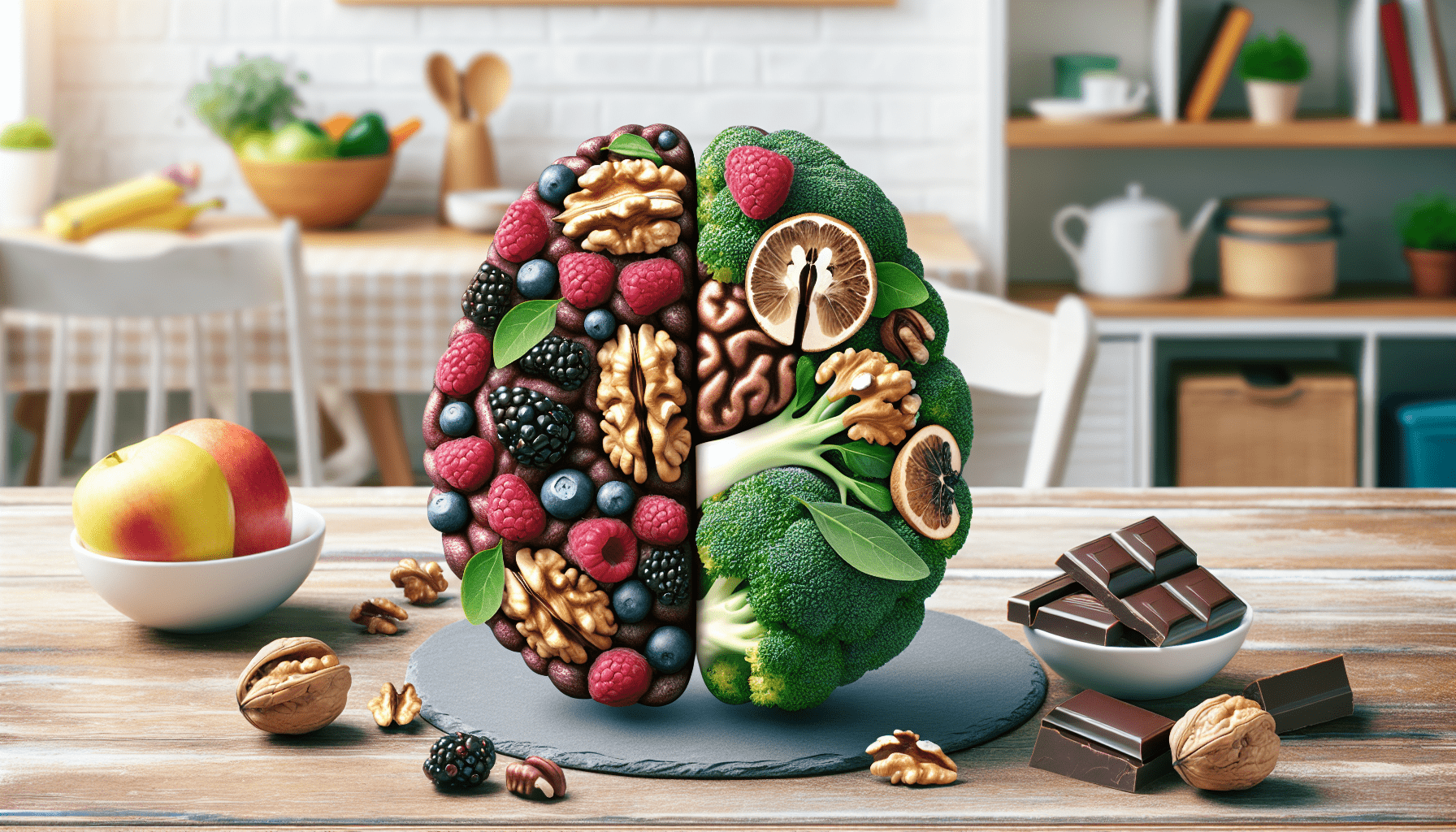Did you know that the fuel you put into your body can have a significant impact on the function of your brain? It’s true! The food you eat plays a vital role in maintaining cognitive health and boosting brain power. But what exactly are the best brain-boosting foods? In this article, we will explore a variety of nutritious options that can help enhance your mental clarity, focus, and overall brain function. So, if you’re looking to give your mind a little extra TLC, keep reading to discover some delicious and nutritious options that can benefit your brain health.
Blueberries
Benefits of blueberries for brain health
Blueberries are a small but mighty fruit that offer numerous benefits for brain health. Packed with antioxidants, blueberries help to protect the brain from oxidative stress and reduce inflammation, which can contribute to age-related cognitive decline. Research suggests that the antioxidants in blueberries can even delay brain aging and improve memory and cognition.
How to incorporate blueberries into your diet
Incorporating blueberries into your diet is easy and delicious. You can simply enjoy a handful of fresh blueberries as a snack, or add them to your morning cereal, yogurt, or smoothie. Blueberries can also be used in baking, such as in muffins, pancakes, or even as a topping for desserts. With their sweet and tangy flavor, blueberries are a versatile fruit that can be enjoyed in various ways.
Fatty fish
Omega-3 fatty acids in fish and brain health
Fatty fish, such as salmon, trout, and sardines, are excellent sources of omega-3 fatty acids, which are essential for brain health. Omega-3 fatty acids help to build cell membranes in the brain and promote the growth of new brain cells. They also have anti-inflammatory properties, which can protect the brain from damage and improve cognitive function. Studies have shown that regular consumption of fatty fish can reduce the risk of age-related cognitive decline and improve memory and focus.
Types of fatty fish to include in your diet
To reap the brain-boosting benefits of fatty fish, incorporate them into your diet at least twice a week. Choose varieties rich in omega-3 fatty acids, such as salmon, mackerel, trout, and sardines. These types of fish are not only delicious but also provide high levels of docosahexaenoic acid (DHA) and eicosapentaenoic acid (EPA), two important omega-3 fatty acids that support brain health.

Turmeric
Curcumin in turmeric and brain function
Turmeric is a vibrant yellow spice commonly used in Asian cuisine, and it contains a powerful compound called curcumin. Curcumin has been found to have neuroprotective properties and can cross the blood-brain barrier, meaning it can directly impact brain function. Studies have shown that curcumin can boost memory and stimulate the production of brain-derived neurotrophic factor (BDNF), a protein that promotes the growth of new brain cells and enhances brain function.
Ways to add turmeric to your meals
Adding turmeric to your meals is a simple and flavorful way to boost your brain health. You can sprinkle turmeric powder into your curries, soups, or stews for a warm and earthy flavor. It can also be used to season roasted vegetables or mixed into scrambled eggs for a vibrant twist. For maximum absorption of curcumin, combine turmeric with black pepper or a source of fat, such as coconut oil. This will help to increase its bioavailability and maximize its brain-boosting benefits.
Broccoli
Nutrients in broccoli that support brain health
Broccoli is often referred to as a superfood, thanks to its high nutrient content, including vitamins, minerals, and antioxidants that support brain health. It contains compounds called glucosinolates, which the body converts into sulforaphane. Sulforaphane has been shown to reduce inflammation in the brain and protect against oxidative stress. Additionally, broccoli is rich in vitamin K, which has been linked to improved brain function and memory.
Delicious recipes with broccoli
Incorporating broccoli into your meals doesn’t have to be boring. You can steam or roast broccoli florets as a simple side dish, or add them to stir-fries, pasta dishes, and salads. For a tasty twist, try making a broccoli and cheddar soup or a broccoli and cheese casserole. These recipes not only provide the brain-boosting benefits of broccoli but also offer a delicious and satisfying meal option.

Pumpkin seeds
Benefits of pumpkin seeds for memory and cognition
Pumpkin seeds are not only a tasty snack but also a great source of nutrients that support memory and cognition. They are rich in antioxidants, magnesium, iron, zinc, and copper, which are all essential for brain health. The antioxidants in pumpkin seeds help to protect the brain from free radicals, while the minerals play a crucial role in neurotransmitter function and cognitive processes. Some studies have also suggested that pumpkin seeds may help improve sleep, which is vital for brain health and function.
Creative ways to use pumpkin seeds in your meals
Pumpkin seeds can be a versatile and nutritious addition to your meals. You can sprinkle them over salads or roasted vegetables for added crunch and flavor. They can also be used as a topping for oatmeal or yogurt, or even blended into smoothies for an extra nutrient boost. Roasting pumpkin seeds with your favorite spices, such as cinnamon or garlic powder, can create a delicious and nutritious snack that you can enjoy on its own or mixed with dried fruits and nuts.
Dark chocolate
Cocoa flavanols and their effect on brain function
Dark chocolate, especially the kind with a high cocoa content, contains powerful antioxidants called cocoa flavanols. These compounds have been found to improve brain function by increasing blood flow to the brain and promoting the growth of new blood vessels. By enhancing blood flow and oxygen delivery to the brain, cocoa flavanols can improve cognitive function, attention, and memory. Additionally, dark chocolate has been shown to boost mood and reduce stress, further benefiting overall brain health.
Tips for choosing and enjoying dark chocolate
When choosing dark chocolate, opt for varieties with a cocoa content of 70% or higher, as these contain higher levels of cocoa flavanols. Enjoy a small piece of dark chocolate as a daily treat or indulge in a chocolate-dipped fruit for a delicious and brain-boosting dessert. Remember to savor the chocolate, allowing it to melt slowly in your mouth, to fully experience its rich flavor and reap its brain-boosting benefits.

Nuts
Types of nuts that boost brain health
Nuts are not only a convenient and delicious snack but also a great source of nutrients that can boost brain health. Some types of nuts, such as walnuts, almonds, and pistachios, are particularly beneficial due to their high levels of antioxidants, healthy fats, vitamins, and minerals. These nutrients have been linked to improved memory, cognition, and overall brain function. Including a variety of nuts in your diet can provide a wide range of brain-boosting benefits.
Incorporating nuts into your daily diet
Incorporating nuts into your daily diet is easy and can be done in many ways. You can enjoy a handful of mixed nuts as a snack, or sprinkle them onto salads, roasted vegetables, or yogurt for added texture and flavor. Nut butters, such as almond butter or cashew butter, can be spread on toast or used as a dip for fruits or vegetables. Adding nuts to your breakfast cereal or incorporating them into baked goods, like granola bars or cookies, is another great way to include them in your daily diet.
Oranges
Vitamin C in oranges and brain health
Oranges are well-known for their high vitamin C content, and this nutrient plays a crucial role in maintaining brain health. Vitamin C is a powerful antioxidant that helps to protect the brain from oxidative stress and reduce inflammation. It also supports the production of neurotransmitters, such as serotonin and dopamine, which are essential for mood regulation and overall brain function. Consuming foods rich in vitamin C, like oranges, can help support a healthy brain and improve cognitive performance.
Fresh and tasty ways to enjoy oranges
Enjoying oranges is not only refreshing but also a simple way to boost your brain health. You can simply peel and eat an orange as a nutritious snack, or squeeze fresh orange juice to enjoy in the morning or as a base for smoothies. Oranges can also be used in salads, added to fruit salads, or even incorporated into savory dishes for a burst of citrus flavor. Get creative with oranges and explore different recipes to fully enjoy their tangy taste and brain-boosting benefits.

Eggs
Choline in eggs and cognitive function
Eggs are a nutritional powerhouse and a rich source of choline, a nutrient that is essential for brain health and cognitive function. Choline is a precursor to acetylcholine, a neurotransmitter that plays a vital role in memory and learning. Studies have shown that adequate choline intake is associated with improved cognitive performance and a reduced risk of age-related cognitive decline. Including eggs in your diet can provide a natural and affordable source of choline for optimal brain health.
Creative egg recipes for brain-boosting meals
Eggs are incredibly versatile and can be used in a variety of delicious recipes that support brain function. Start your day with a hearty breakfast by making an omelet or scrambled eggs loaded with vegetables like spinach and mushrooms. You can also make a vegetable and egg frittata for a quick and nutritious lunch or dinner. For a portable brain-boosting snack, try making egg muffin cups with your favorite vegetables and herbs. With eggs, the possibilities are endless for creating brain-boosting meals that are both delicious and satisfying.
Green tea
Catechins in green tea and brain function
Green tea has long been celebrated for its numerous health benefits, including its potential to enhance brain function. It contains a unique compound called catechins, which are powerful antioxidants that can cross the blood-brain barrier. Catechins have been shown to have neuroprotective properties and may help protect the brain against age-related cognitive decline and reduce the risk of neurodegenerative diseases. Additionally, green tea contains a moderate amount of caffeine, which can improve alertness and concentration.
Tips for brewing the perfect cup of green tea
Brewing the perfect cup of green tea is essential to fully enjoy its brain-boosting benefits. Start by using high-quality loose green tea leaves or tea bags. Bring water to a boil and then allow it to cool for a few minutes before pouring it over the tea leaves or bags. Steep the tea for 2-3 minutes to extract the right amount of flavor and catechins. Avoid oversteeping, as it may result in a bitter taste. If desired, you can add a squeeze of lemon or a teaspoon of honey to enhance the flavor. Enjoy your cup of green tea in a calm and relaxed environment to fully experience its soothing and brain-boosting effects.
Incorporating brain-boosting foods into your daily diet is a simple and enjoyable way to support cognitive function and overall brain health. Whether you choose to add blueberries to your morning cereal, sprinkle pumpkin seeds on your salads, or savor a piece of dark chocolate, these foods can provide a natural and nutritious boost for your brain. So why not give your brain the nourishment it deserves and start incorporating these delicious and brain-boosting foods into your meals today? Your mind will thank you for it.






